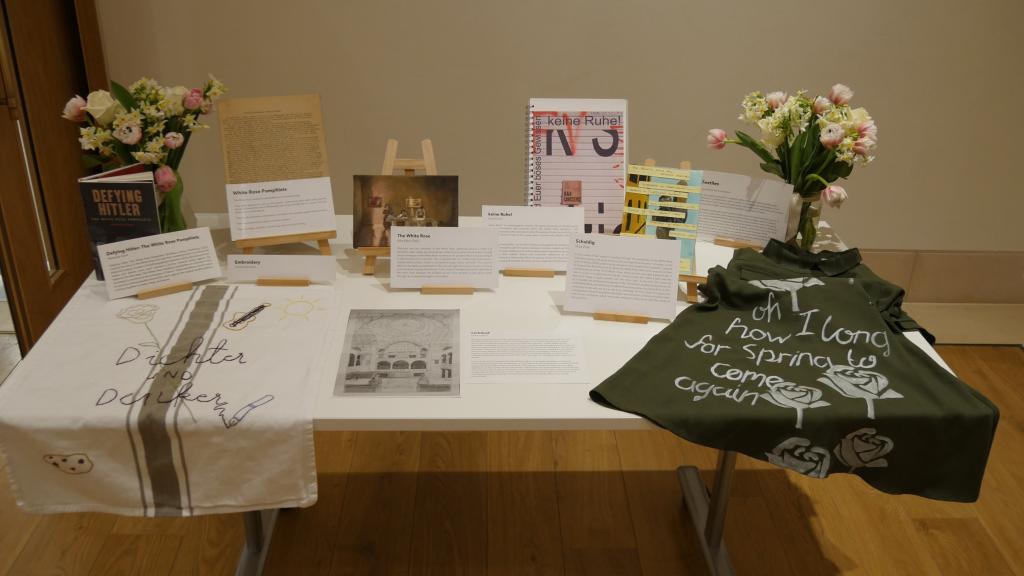
80 years ago, on 18 February 1943, two students in the southern German city of Munich entered the main building of their university. Brother and sister Hans Scholl and Sophie Scholl took piles of paper from a suitcase and briefcase they had brought with them and began depositing them around the corridors and balconies. The hall was quiet and deserted. Students and academics were in the classrooms and lecture halls that lined the corridors. Hans and Sophie had planned to disappear among the many students pouring out of their lectures, but they were spotted by the university caretaker and apprehended. The authorities were called; Hans and Sophie were questioned and then taken in handcuffs to the Gestapo prison just under a mile away. That evening, miles away in Berlin, Propaganda Minister Joseph Goebbels was calling on Germans to support ‘total war’ after the German Army’s defeat at the Battle of Stalingrad. Later that evening another member of the resistance, student Willi Graf, was arrested. Two days later, Christoph Probst – a student and father of three – was also taken into custody.
On Monday 22 February at around 9am, Hans Scholl, Sophie Scholl, and Christoph Probst were taken to the Palace of Justice in Munich and tried by the so-called People’s Court. By 1pm the trial was over, and all three students had been sentenced to death. They were executed by guillotine later that same day. On Wednesday 24 February student Alexander Schmorell was arrested, and on Saturday 27 February a lecturer at the university, Professor Kurt Huber, was apprehended. By October 1943, Alexander Schmorell, Kurt Huber, and Willi Graf had been executed. Further trials and judgements for the work of the White Rose were still to come.
The core members of the White Rose circle were tried and executed for secretly writing, printing, and disseminating anti-Nazi, anti-war pamphlets. They used the written word to try to convince others to resist Nazism. The pamphlets speak of conscience, courage, and personal responsibility. They are remarkable texts.
The White Rose Project at the University of Oxford was launched in October 2018 and was originally intended as a one-year translation project. I had read the White Rose resistance pamphlets and thought it could be exciting and productive to have an English translation by students around about the same age as the student authors of the pamphlets. I also thought it could be interesting to attempt a translation that was collaborative, mirroring the collaborative authorship of the originals.
It became clear almost as soon as the project began, that there was great potential to bring the history of the White Rose to a wider audience, and to pursue new research on the group alongside discussion with students and knowledge exchange with creative partners. The project, now in its fifth year, combines outreach work to schools, public engagement activities, research, and translation. Over the past five years, more than eighty undergraduate and graduate students from across the University of Oxford have been involved as translators, performers, and co-organisers. The project is privileged to work with the Weiße Rose Stiftung e.V. (White Rose Foundation) in Munich, and with the award-winning vocal collective SANSARA.
On Saturday 18 February 2023, the staff and student members of the White Rose Project presented a performance of images, words, and song to commemorate the White Rose, 80 years on. Students read excerpts from the White Rose pamphlets, translated by members of the project and published in Alexandra Lloyd, Defying Hitler – The White Rose Pamphlets (Bodleian Library Publishing, 2022). They also read creative pieces devised during seminars and writing workshops in the academic years 2021-2022 and 2022-2023, including poetry and prose in English and German. The texts were interspersed with music performed by soprano Lucinda Cox and pianist Tom Jesty, including works by G.F. Handel, Franz Schubert, Fanny Hensel, Richard Strauss, and Maude Valérie White. Music was a profoundly important part of the White Rose members’ lives, and our performance included songs by composers the White Rose members knew and loved. As Sophie Scholl wrote in 1942: ‘Music softens the heart; orders its confusion, relaxes its tension, and creates the conditions for the work of the spirit in the soul, which before knocked in vain at its tightly sealed doors’*.
We also put together a display of creative translations of the White Rose pamphlets by our students, including poetry, painting, textiles and embroidery, and photography. The students’ work speaks to their deep engagement with the history and legacy of the White Rose. It is easy just now, of course, to point to parallels between the past and the present, to injustices which persist, to inequality, suffering, political manipulation and the exploitation of the innocent. Part of our work in the project is to discuss these things and to think deeply and critically about the past, present, and future, in the same way that the White Rose members themselves did and exhorted others to do.
For more information on the White Rose Project, and to read the students’ work, please visit our website and follow @whiteroseoxford on social media (Twitter, Facebook, Instagram).
* Cited in Hans Scholl, Sophie Scholl, Briefe und Aufzeichnungen, ed. by Inge Jens (Frankfurt a.M.: Fischer, 1988), p. 251